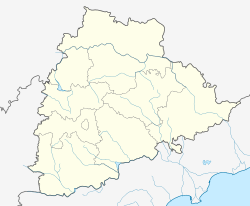The district has a relatively high proportion of small and marginal farmers.
Deployment Approaches
| Approaches | Feasibility |
|---|---|
| Individually owned off-grid solar pumps | Limited Suitability |
| Solarisation of feeders | Limited Suitability |
| Solar based water as a service | Limited SUitability |
| Promote 1 HP and sub-HP pumps | Limited Suitability |
| Solarisation of individual grid-connected pumps | Limited suitability |
Individually owned off-grid solar pumps
Limited Suitability
The district has a relatively high disbursement of institutional credit and high crop revenue per holding. However, ground water availability is below the safe limit, and concentration of diesel pump users is comparatively low, making it very difficult to promote the private ownership of solar pumps here.
| Parameter | Value | Percentile |
|---|---|---|
| Number of cultivators reporting use of diesel pumps | 16,291 | 49 |
| Water Availability Index | 0.28 | 20 |
| Crop revenue per holding (INR) | 100,715 | 58 |
| Medium and long term institutional credit disbursed in a year (in INR Crore) | 229.1 | 84 |
Solarisation of feeders
Limited Suitability
The district has a relatively high penetration of electric pumps, and its DISCOM incurs a high cost for supplying power, but the district has a comparatively low extent of feeder segregation. Solarisation of the feeders will only be possible once the district separates agricultural feeders from the rest.
| Parameter | Value | Percentile |
|---|---|---|
| Actual cost of power supply (INR/kWh) | 6.32 | 72 |
| Extent of feeder segregation | 3% | 25 |
| Proportion of cultivators reporting use of electric pumps | 34% | 82 |
Solar based water as a service
Limited SUitability
The district has a relatively high concentration of small and marginal farmers, and a rather high proportion of unirrigated area, but groundwater availability is below the safe limit. Water conservation and efficient irrigation practices (such as drip irrigation) should be considered while promoting solar-based water as a service, in order to improve the economic viability of the model, increase water availability, and decrease the effective cost of irrigation in the district.
| Parameter | Value | Percentile |
|---|---|---|
| Water Availability Index | 0.28 | 20 |
| Proportion of small and marginal cultivators | 90% | 61 |
| Unirrigated net sown area as a share of total net sown area | 60% | 50 |
Promote 1 HP and sub-HP pumps
Limited Suitability
The concentration of marginal farmers in the district is rather high and the disbursement of institutional credit to marginal farmers is also comparatively high. But, groundwater availability is below the safe limit and proportion of gross cropped area under horticulture is relatively low, making viability of small pumps difficult. Such pumps can be promoted in suitable areas of the district along with promotion of micro-irrigation as well as horticultural crops.
| Parameter | Value | Percentile |
|---|---|---|
| Area under horticulture crops as a share of gross cropped area | 5% | 50 |
| Water Availability Index | 0.28 | 20 |
| Proportion of marginal cultivators | 68% | 56 |
| Medium and long term institutional credit disbursed in a year (in INR Crore) | 229.1 | 84 |
Solarisation of individual grid-connected pumps
Limited suitability
The district has a relatively high penetration of electric pumps and power supply to its agriculture consumers is heavily subsidised. But the district has a comparatively low extent of feeder segregation and its groundwater availability is below the safe limits. Solarisation of individual grid-connected pumps will only be possible once the district separates agricultural feeders from the rest. Further the approach should be taken up with extreme caution as it may aggrevate the groundwater depletion.
| Parameter | Value | Percentile |
|---|---|---|
| Water Availability Index | 0.28 | 20 |
| Actual cost of power supply (INR/kWh) | 6.32 | 72 |
| Extent of feeder segregation | 3% | 25 |
Leveraging Solar Pumps to Promote Policy Objectives
If you are deploying solar pumps in this district then you can further these policy objectives.
Har Khet ko Pani
A relatively high proportion of the net sown area in the district is unirrigated, indicating high irrigation demand. Solar pumps can help improve access to underground irrigation as part of Har Khet ko Pani.
| Parameter | Value | Percentile |
|---|---|---|
| Unirrigated net sown area as a share of total net sown area | 60% | 50 |
Doubling Farmers’ Income – Capital Investment
Given the high concentration of small and marginal farmers, and their relatively better access to institutional credit, the district is suitable for doubling farmers’ income through capital investment. Solar pumps could be one of the farm technologies to invest in for farmers, especially 1 HP or sub-HP pumps for marginal farmers.
| Parameter | Value | Percentile |
|---|---|---|
| Proportion of small and marginal cultivators | 90% | 61 |
| Medium and long-term institutional credit disbursed in a year to small and marginal cultivators (in INR Crore) | 229.1 | 84 |
Doubling Farmers’ Income – Crop Intensity
A relatively high proportion of the district’s net sown area is unirrigated. Lack of access to irrigation is one of the major barriers to growing crops beyond two conventional seasons, rabi and kharif. Ensuring irrigation access through solar power will help improve cropping intensity and move towards the aim of doubling farmers’ income by 2022.
| Parameter | Value | Percentile |
|---|---|---|
| Unirrigated net sown area as a share of total net sown area | 60% | 50 |
Doubling Farmers’ Income – Crop Diversification
In the district, horticulture crops occupy a relatively low proportion of gross cropped area, indicating an opportunity for growing more high value non-staple crops. Solar-powered irrigation could be an alternative source of reliable irrigation, making it easier to achieve crop diversification and enhance farmers’ incomes.
| Parameter | Value | Percentile |
|---|---|---|
| Area under horticulture crops as a share of gross cropped area | 5% | 50 |
National Mission on Oilseeds and Oil Palm (NMOOP)
The relatively low share of oilseeds and oil palm crops under gross sown area in the district makes it a suitable candidate for promoting NMOOP. Solar pumps could meet irrigation needs for these crops and help farmers diversify their yields beyond cereals.
| Parameter | Value | Percentile |
|---|---|---|
| Area under oilseeds as a share of total cropped area | 42 |
Per Drop More Crop
In the district, crops suitable for drip and sprinkler irrigation occupy a relatively high proportion of gross cropped area, making it easy to adopt such high precision irrigation methods. Solar pumps, along with other efficient and precise water application devices, could be deployed under Per Drop More Crop to promote efficient irrigation.
| Parameter | Value | Percentile |
|---|---|---|
| Area under crops suitable for drip and sprinkler irrigation as a share of total cropped area | 42% | 79 |


